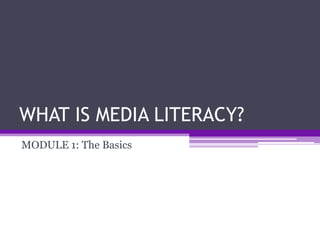
Module1 1
- 1. WHAT IS MEDIA LITERACY? MODULE 1: The Basics
- 2. Lesson Module Outcomes: • In this lesson students will: ▫ Learn the definition of media literacy and how it has changed over the years. ▫ Look at a brief history of media and pivotal developments in more recent years. ▫ Understand the generation gap in regards to media literacy and its affects.
- 3. Introductory Discussion • Think about the following question on your own for a few minutes and write down a definition. Then discuss among the class. • How do you define media literacy?
- 4. Media Literacy Defined • According to the Center for Media Literacy: ▫ In 1992: Media literacy is the ability to access, analyze, evaluate and create media in a variety of forms.” ▫ Today: “Media literacy is a 21st century approach to education. It provides a framework to access, analyze, evaluate, create and participate with messages in a variety of forms – from print to video to the Internet. Media literacy builds an understanding of the role of media in society as well as essential skills of inquiry and self-expression necessary for citizens of democracy.”
- 5. STOP! • Go back and read the definitions again. What are the main differences you see between how media literacy was defined in 1992 and today?
- 6. Comparing the Definitions ▫ In 1992: It is the ability to access, analyze, evaluate and create media in a variety of forms. ▫ Today: It is the ability to access, analyze, evaluate, create and participate with media in a variety of forms. ▫ Key difference is the idea of PARTCIPATION. ▫ Why do you think participation has been added to the definition? What are some examples of media (think recent developments) that include participation?
- 7. Almost every piece of this timeline includes PARTICIPATION
- 8. • Now, watch "An Ever Changing World” ▫ This video clip was uploaded in 2009. ▫ It is a short animation looking at recent technological and social changes in recent years and their effects. • After looking at the previous graphic and this clip, think about the major media developments mentioned in each and how they include the idea of participation. • Both resources are from 2009. Have you seen other changes in the media since? Do they involve participation also? Discuss.
- 9. Participation Continued • Think about the way media literacy has evolved to include the idea of participation and how it could affect different generations. • The idea of a generation gap in technology is nothing new, but today technology is developing faster than ever. • Is there a lack of understanding between parents and/or teachers and their students?
- 10. Participation Continued • Recent media developments including participation ▫ Google, Wikipedia, Youtube, Facebook, Twitter, Myspace, L inkedIn, Flickr, Blogger…. The list continues. • Think about these specifically in regards to a generation gap. How many of your parents use any of these recent media developments? What about your grandparents?
- 11. Case Study • The Society for Information Technology & Teacher Education held a study with 86 participants asking what kinds of technology they use and how often. • Researchers expected to see a strong divide in the use of technologies by different generations, but the divide was more about the reason for using these technologies. Differences in using technologies for a “need to know” reason versus exploration for the sake of entertainment.
- 12. Audio Clip from MPRNews • New study from Kaiser Family Foundation says that teenagers/children spend up to 8 hours a day consuming media, which is 2 hours above the average just two years ago. • Implications? Communication and technology is widening the generation gap between today’s teenagers/children and their parents.
- 13. Class Activity • Looking more at the idea of a generation gap in media literacy, think about the ways in which you get your information today in comparison to your parents, grandparents, teachers, etc. • Chances are that you largely rely on Google or a similar search engine such as Bing, Yahoo, Ask, etc. when you have research to do or a simple question to ask.
- 14. Continued • There are 31 billion searches on Google a month. ▫ How did we get answers before Google? Who did the previous generations direct their questions to? • Use the Internet, but avoid Google and the other search engines to find the answer to the following question: ▫ When did Google begin and by whom?
- 15. Continued • Having trouble? • Discuss the difficulties you came across with finding these answers as a class. • Have we become too Google-dependent?
- 16. Assignment 1: • Participate in the poll on the main page. After submitting your answer, consider the other options and write a summary ranking the way you use these media sources and what for (news, information, entertainment, etc.) • In your summary, discuss how your poll answer would differ from your parents, grandparents, teachers, etc. and why you think so.